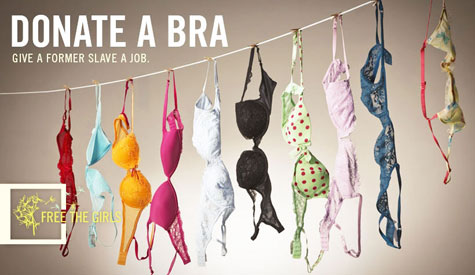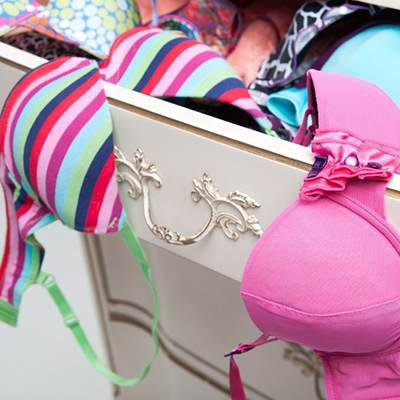
“Free the Girls” uses advertisements like these to collect bra donations and give women jobs. – Image courtesy of Free the Girls
Bras are the hottest item in the second-hand clothing market. So David Terpstra, A former pastor at Next Level Church in Englewood, Colorado, uses them to provide jobs for sex trafficking survivors in Sub-Saharan Africa. His organization, “Free the Girls,” collects thousands of bras from women in the United States, which are then sold to other women in Mozambique by the survivors. Here, he discusses why he chose bras and defends the sustainability of his model.
RNS: What was the need you recognized among trafficking survivors?
DT: One of the most significant challenges I hear from those who work with survivors is the difficulty survivors have reentering the workforce. Their lives have been stolen from them. Usually taken as children, they were unable to finish school and have been through years of trauma. We have found that those who are most skilled with helping them to process through the trauma and get back on a track towards wholeness are not the same people with the skill sets to provide jobs and job training. That’s where we love to help.
RNS: Why bras?
DT: Bras work well for a number of reasons. From the sales standpoint, they are the hottest item in the second-hand clothing market. Bras fetch a higher price per kilogram than any other item of used clothing on the second-hand clothing market. Also, they are small and portable. Girls can carry them in their backpacks to school, they can drape them over their arms, or they can string them up along a clothesline. Best of all, only women buy them. Because the women with whom we work have been used and abused by men for so long, it is much safer for them to be selling to other women.
Bras also work well from a collection standpoint. We like to say that every woman in America has a graveyard in the back of her underwear drawer full of bras they don’t use, or never fit right in the first place. We take those bras and put them to good use.
RNS: Some American women describe the psychological “ick” factor of buying and wearing a used bra. Is this a factor in the communities you serve?
DT: There is no ick factor in buying second-hand clothes in the developing world. When we were first starting Free The Girls, I was out scouting how bras were selling in the local markets. I was at a bra stand that was set up at the side of the road when a BMW pulled up. Out stepped a women in a dress-suit and high heels. She pulled down her designer sunglasses to look at a couple of the bras, pulled one off the rack, paid for it, and got back into her Beamer.
RNS: I know women donating bras can include a note to the survivors. Can you share what some of those notes say?
DT: One supporter writes: “I am sending 15 bras – I have prayed for anyone that will touch these bras – that they will know love, freedom, happiness and most of all Jesus Christ.” Another wrote, “Know that you are loved and thought about. We are all sisters, and I pray for your complete recovery from this horrible abuse. Do well and make LOTS of money!”
But one of my favorites said, “Dear friend, I may not know you personally but I do know you are beautiful, strong, wonderful and important! It makes me proud to call you a friend. I would encourage you to keep doing what you are doing and to hold your head high. I want you to know that you are loved. When life brings you down, remember someone her in the USA loves you and is thinking of you.”
RNS: Have you employed a sustainable business model, or do women become dependent on donations from FTG?
DT: Sometimes people are shocked to learn that we don’t just give the bras to the women with whom we work; we sell the bras to them. We help survivors start small businesses selling bras. These are real businesses that compete with other second-hand clothes vendors in local markets. We give our women their first bag of bras for free, but then we sell additional bags to them with a slight advantage on price over what they would normally spend to buy bras in bulk. Doing this we make enough money to pay for our in-country program and to pay for the next shipment of bras to their country.
That means that once we start a program in a country, it funds itself. We don’t need to continue to add more funds, because the sale of the bras pays for the program and the next shipment. Also, because our women are paying near market price for the bras they buy from us, they are able to duplicate our model to purchase other clothes in bulk. Some of the women in our program also sell skirts, curtains, and other clothes they have purchased for themselves with the money they made selling bras.
RNS: How does selling second-hand clothing impact the local production and sale of clothing?
DT: Second-hand clothes have at least some impact on the local production and sale of clothing. Fortunately for our model, bras are one of the most complicated clothing items to manufacture, so few countries with burgeoning textile industries manufacture them. We do our best to investigate each country where we have a potential partner to check the second-hand clothing market and the textile industry before we sign off on a partnership. We don’t want to kill local industry with our model.
A promo video by “Free The Girls” explains their model:






